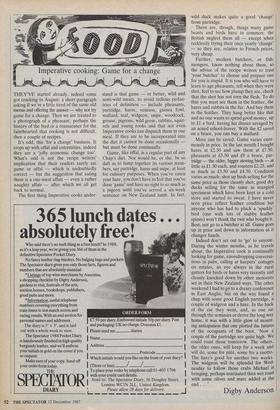Imperative cooking: Game for a change THEY'VE started already, indeed
some got cracking in August: a short paragraph asking if we're a little tired of the same old menus and offering the answer — why not try game for a change. Then we are treated to a photograph of a pheasant, perhaps the history of the bird or a reassurance for the , fainthearted that cooking is not difficult, then a couple of recipes.
It's odd, this 'for a change' business. It crops up with offal and extremities, indeed they are a 'jolly economic change too'. What's odd is not the recipe writers' implication that their readers rarely eat game or offal — which is undoubtedly correct — but the suggestion that eating them is a one-meal affair — even a rather naughty affair — after which we all get back to normal.
The first thing Imperative cooks under- stand is that game — or better, wild and. semi-wild meats, to avoid tedious pedan- tries of definition — include pheasants, partridge, hares, venison, guinea fowl, mallard, teal, widgeon, snipe, woodcock, grouse, pigeons, wild geese, rabbits, squir- rels and young rooks and that not even Imperative cooks can dispatch them in one meal. If they are to be incorporated into the diet it cannot be done occasionally but must be done continually.
Game, like offal, is a regular part of any Chap's diet. Nor would he, or she, be so daft as to lump together its various mem- bers, say partridge, hares and snipe, at least for culinary purposes. When you've eaten your hare, you don't have to feel that you've done 'game' and have no right to so much as a pigeon until you've served a six-week sentence on New Zealand lamb. In fact, wild duck makes quite a good 'change' from partridge.
There are, though, things many game beasts and birds have in common: the British neglect them all — except when recklessly trying their once yearly 'change' — so they are, relative to French prices, very cheap.
Further, modem butchers, or fish- mongers, know nothing about them, so the advice of the recipe writers to trust `your butcher' to choose and prepare one for you is stupid. It is you who will have to learn to age pheasants, tell when they were shot, feel to see how plump they are, check that the shot has not torn the flesh. To do that you must see them in the feather, the hares and rabbits in the fur. And buy them in the feather. They hang better like that and no one wants to spend good money, up to £1 a bird, having his dinner savaged by an acned school-leaver. With the £2 saved on a brace, you can buy a mallard.
More can be saved. Game varies enor- mously in price. In the last month I bought hares at £2.50 and saw them at £7.50, pheasants at £3.50 and £9 a brace, par- tridge — the older, bigger stewing birds — as little as £1.50 each, and roasters £2.25, and as much as £3.50 and £4.50. Condition varies as much: shot up birds selling for the same price as those cleanly shot; good dry ducks selling for the same as mangled specimens which have been kept in a cold store and started to sweat. I have never seen price reflect feather condition but anyone who has had to pluck a `spuddy' bird (one with lots of stubby feather spines) won't thank the twit who bought it. Best, not go to a butcher at all. Game goes up in price and down in information as it changes hands.
Indeed don't set out to 'go' to anyone. During the winter months, as he travels about, the Imperative cook is continually looking for game, eavesdropping conversa- tions in pubs, calling at keepers' cottages on estates, an eye always in the rural gutters for birds or hares very recently and cleanly knocked down by other motorists set in their New Zealand ways. The other weekend I had to go to a dreary conference in East Anglia, but on the way found a chap with some good English partridge, a couple of widgeon and a hare. In the back of the car they went, and, as one sat through the seminars or drove the long way home, it was with a little glow of mount- ing anticipation that one plotted the futures of the occupants of the boot, 'Now a couple of the partridge are quite high. We could roast those tomorrow. The others, the older ones, will keep for a week and will do, some for pâté, some for a risotto. The hare's good for another two weeks. The widgeon will be splendid for Wed- nesday to follow those crabs Michael is bringing, perhaps marinated then wet roast with some olives and mart added at the end . .
Digby Anderson


























































 Previous page
Previous page